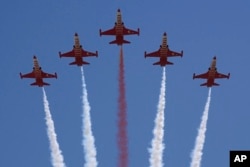Nicosia, Cyprus —
Greek Cypriots mourned and Turkish Cypriots rejoiced Saturday, the 50th anniversary of Turkey's invasion of part of the island after a brief Greek inspired coup, with the chances of reconciliation as elusive as ever.

The ethnically split island is a persistent source of tension between Greece and Turkey, which are both partners in NATO but are at odds over numerous issues.
Their differences were laid bare Saturday, with Turkish President Recep Tayyip Erdogan attending a celebratory military parade in north Nicosia to mark the day in 1974 when Turkish forces launched an offensive that they called a "peace operation."
"The Cyprus Peace Operation saved Turkish Cypriots from cruelty and brought them to freedom," Erdogan told cheering crowds who gathered in north Nicosia."We are ready for negotiations, to meet, and to establish long-term peace and resolution in Cyprus," he said, adding that Greek and Greek Cypriot calls to reunite Cyprus under a federal umbrella — which are prescribed in U.N. resolutions — are no longer possible.
Greek Cypriots want reunification as a federation. Turkish Cypriots want a two-state settlement.
"We have one aim: a Republic of Cyprus with a single sovereignty, a single international personality, a single nationality, in a bizonal, bicommunal federation, a single state where all citizens will be Cypriots and Europeans, without a foreign occupation army, without outdated guarantees," Greek Prime Minister Kyriakos Mitsotakis told a somber event in the southern parts of Nicosia in remembrance of 1974.
Greece and Turkey recently agreed to discuss how to improve relations, but "the fact that we have been discussing doesn't mean that we agree and, more importantly, that we back down," Mitsotakis said.
Remembering the dead
Cyprus gained independence from Britain in 1960, but a shared administration between Greek and Turkish Cypriots quickly fell apart in violence that saw Turkish Cypriots withdraw into enclaves and led to the dispatch of a U.N. peacekeeping force.
The crisis left Greek Cypriots running the internationally recognized Republic of Cyprus, a member of the European Union since 2004 with the potential to derail Turkey's own decadeslong aspirations of joining the bloc.
It also complicates any attempts to unlock energy potential in the eastern Mediterranean because of overlapping claims. The region has seen major discoveries of hydrocarbons in recent years.
Cypriot President Nikos Christodoulides, whose office represents the Greek Cypriot community in the reunification dialogue, said the anniversary was a somber occasion for reflection and for remembering the dead.
"The condemnable and unacceptable events we see happening in Ukraine today ... were perpetrated 50 years ago in Cyprus and we are living its consequences every day," he said.
Across the south, church services were held to remember the more than 3,000 people who died in the Turkish invasion.
"It was a betrayal of Cyprus and so many kids were lost. It wasn't just my son, it was many," said Loukas Alexandrou, 90, as he tended the grave of his son at a military cemetery.
In Turkey, blanket state television coverage focused on violence against Turkish Cypriots prior to the invasion, particularly on bloodshed in 1963-64 and in 1967.
Turkey's invasion took more than a third of the island and expelled more than 160,000 Greek Cypriots to the south.
Reunification talks collapsed in 2017 and have been at a stalemate since. Northern Cyprus is a breakaway state recognized only by Turkey, and its Turkish Cypriot leadership wants international recognition.





























































